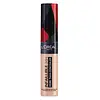What's inside
What's inside
 Key Ingredients
Key Ingredients

 Benefits
Benefits

 Concerns
Concerns

 Ingredients Side-by-side
Ingredients Side-by-side

Water
Skin ConditioningIsododecane
EmollientCyclopentasiloxane
EmollientTrimethylsiloxysilicate
EmollientButylene Glycol
HumectantCetyl PEG/PPG-10/1 Dimethicone
EmulsifyingTalc
AbrasiveCetearyl Ethylhexanoate
EmollientAcrylates Crosspolymer
AbsorbentDimethicone/Vinyl Dimethicone Crosspolymer
Skin ConditioningMagnesium Sulfate
Bis-PEG/PPG-14/14 Dimethicone
EmollientBoron Nitride
AbsorbentAmmonium Acrylates Copolymer
Tribehenin
EmollientIsopropyl Titanium Triisostearate
EmollientDisteardimonium Hectorite
StabilisingLecithin
EmollientLaureth-7
EmulsifyingAlumina
AbrasivePhenoxyethanol
PreservativeTrihydroxystearin
Skin ConditioningChlorphenesin
AntimicrobialPropylene Carbonate
SolventXanthan Gum
EmulsifyingAlcohol Denat.
AntimicrobialGlycerin
HumectantTocopheryl Acetate
AntioxidantDisodium EDTA
Disodium Deceth-6 Sulfosuccinate
CleansingSilica
AbrasiveSodium PCA
HumectantUrea
BufferingLaureth-30
CleansingSodium Dehydroacetate
PreservativeTrehalose
HumectantHexylene Glycol
EmulsifyingPolyquaternium-51
Skin ConditioningCaprylyl Glycol
EmollientTriacetin
AntimicrobialSodium Hyaluronate
HumectantPentaerythrityl Tetra-Di-T-Butyl Hydroxyhydrocinnamate
AntioxidantCI 77891
Cosmetic ColorantIron Oxides
Water, Isododecane, Cyclopentasiloxane, Trimethylsiloxysilicate, Butylene Glycol, Cetyl PEG/PPG-10/1 Dimethicone, Talc, Cetearyl Ethylhexanoate, Acrylates Crosspolymer, Dimethicone/Vinyl Dimethicone Crosspolymer, Magnesium Sulfate, Bis-PEG/PPG-14/14 Dimethicone, Boron Nitride, Ammonium Acrylates Copolymer, Tribehenin, Isopropyl Titanium Triisostearate, Disteardimonium Hectorite, Lecithin, Laureth-7, Alumina, Phenoxyethanol, Trihydroxystearin, Chlorphenesin, Propylene Carbonate, Xanthan Gum, Alcohol Denat., Glycerin, Tocopheryl Acetate, Disodium EDTA, Disodium Deceth-6 Sulfosuccinate, Silica, Sodium PCA, Urea, Laureth-30, Sodium Dehydroacetate, Trehalose, Hexylene Glycol, Polyquaternium-51, Caprylyl Glycol, Triacetin, Sodium Hyaluronate, Pentaerythrityl Tetra-Di-T-Butyl Hydroxyhydrocinnamate, CI 77891, Iron Oxides
Water
Skin ConditioningUndecane
EmollientGlycerin
HumectantDimethicone
EmollientPolyglyceryl-4 Isostearate
EmulsifyingSynthetic Fluorphlogopite
Pentylene Glycol
Skin ConditioningButylene Glycol
HumectantTridecane
PerfumingCetyl PEG/PPG-10/1 Dimethicone
EmulsifyingHexyl Laurate
EmollientMagnesium Sulfate
Polyhydroxystearic Acid
EmulsifyingOctyldodecanol
EmollientDisteardimonium Hectorite
StabilisingDisodium Stearoyl Glutamate
CleansingCellulose Gum
Emulsion StabilisingEthylhexylglycerin
Skin ConditioningSilica Silylate
EmollientAcrylonitrile/Methyl Methacrylate/Vinylidene Chloride Copolymer
Parfum
MaskingTrihydroxystearin
Skin ConditioningAluminum Hydroxide
EmollientAcetylated Glycol Stearate
EmollientIsobutane
Hexyl Cinnamal
PerfumingBenzyl Salicylate
PerfumingLinalool
PerfumingAlpha-Isomethyl Ionone
PerfumingBenzyl Alcohol
PerfumingTocopherol
AntioxidantCitronellol
PerfumingHelianthus Annuus Seed Oil
EmollientPentaerythrityl Tetra-Di-T-Butyl Hydroxyhydrocinnamate
AntioxidantCI 77891
Cosmetic ColorantCI 77491
Cosmetic ColorantCI 77492
Cosmetic ColorantCI 77499
Cosmetic ColorantCI 77510
Cosmetic ColorantWater, Undecane, Glycerin, Dimethicone, Polyglyceryl-4 Isostearate, Synthetic Fluorphlogopite, Pentylene Glycol, Butylene Glycol, Tridecane, Cetyl PEG/PPG-10/1 Dimethicone, Hexyl Laurate, Magnesium Sulfate, Polyhydroxystearic Acid, Octyldodecanol, Disteardimonium Hectorite, Disodium Stearoyl Glutamate, Cellulose Gum, Ethylhexylglycerin, Silica Silylate, Acrylonitrile/Methyl Methacrylate/Vinylidene Chloride Copolymer, Parfum, Trihydroxystearin, Aluminum Hydroxide, Acetylated Glycol Stearate, Isobutane, Hexyl Cinnamal, Benzyl Salicylate, Linalool, Alpha-Isomethyl Ionone, Benzyl Alcohol, Tocopherol, Citronellol, Helianthus Annuus Seed Oil, Pentaerythrityl Tetra-Di-T-Butyl Hydroxyhydrocinnamate, CI 77891, CI 77491, CI 77492, CI 77499, CI 77510
 Reviews
Reviews

Ingredients Explained
These ingredients are found in both products.
Ingredients higher up in an ingredient list are typically present in a larger amount.
Butylene Glycol (or BG) is used within cosmetic products for a few different reasons:
Overall, Butylene Glycol is a safe and well-rounded ingredient that works well with other ingredients.
Though this ingredient works well with most skin types, some people with sensitive skin may experience a reaction such as allergic rashes, closed comedones, or itchiness.
Learn more about Butylene GlycolThis ingredient is a high molecular weight silicone. It has emulsifying and skin conditioning properties.
Ci 77891 is a white pigment from Titanium dioxide. It is naturally found in minerals such as rutile and ilmenite.
It's main function is to add a white color to cosmetics. It can also be mixed with other colors to create different shades.
Ci 77891 is commonly found in sunscreens due to its ability to block UV rays.
Learn more about CI 77891Disteardimonium Hectorite comes from the clay mineral named hectorite. It is used to add thickness to a product.
It can also help stabilize a product by helping to disperse other ingredients.
Hectorite is a rare, white clay mineral.
Learn more about Disteardimonium HectoriteGlycerin is already naturally found in your skin. It helps moisturize and protect your skin.
A study from 2016 found glycerin to be more effective as a humectant than AHAs and hyaluronic acid.
As a humectant, it helps the skin stay hydrated by pulling moisture to your skin. The low molecular weight of glycerin allows it to pull moisture into the deeper layers of your skin.
Hydrated skin improves your skin barrier; Your skin barrier helps protect against irritants and bacteria.
Glycerin has also been found to have antimicrobial and antiviral properties. Due to these properties, glycerin is often used in wound and burn treatments.
In cosmetics, glycerin is usually derived from plants such as soybean or palm. However, it can also be sourced from animals, such as tallow or animal fat.
This ingredient is organic, colorless, odorless, and non-toxic.
Glycerin is the name for this ingredient in American English. British English uses Glycerol/Glycerine.
Learn more about GlycerinMagnesium Sulfate is a salt. More specifically, it is an epsom salt, or the bath salt used to help relieve muscle aches.
Despite having ‘sulfate’ in the name, it isn’t a surfactant or cleansing agent like sodium lauryl sulfate. Unlike those sulfates, magnesium sulfate doesn’t have the same cleansing or foaming properties (it's simply a type of salt).
In cosmetics, Magnesium Sulfate is used to thicken a product or help dilute other solids. It is a non-reactive and non-irritating ingredient.
One study shows magnesium deficiency may lead to inflammation of the skin. Applying magnesium topically may help reduce inflammation.
You can find this ingredient in sea water or mineral deposits.
Learn more about Magnesium SulfatePentaerythrityl Tetra-Di-T-Butyl Hydroxyhydrocinnamate (long name, huh?) is a synthetic antioxidant.
It is used to help stabilize other antioxidants or prevent the color from changing in a product.
As an antioxidant, it helps fight free-radical molecules. Free-radical molecules are capable of damaging our cells and other genetic material. Thus, antioxidants may reduce the signs of aging.
This ingredient is oil-soluble.
Learn more about Pentaerythrityl Tetra-Di-T-Butyl HydroxyhydrocinnamateThis ingredient comes from Hydroxystearic Acid, a fatty acid, and glycerin. It is used to thicken oils.
Due to its fatty acid content, it is a natural emollient.
Creating trihydroxystearin involves using a chemical reaction between hydrogen and castor oil.
This ingredient may not be Malassezia folliculitis safe.
Learn more about TrihydroxystearinWater. It's the most common cosmetic ingredient of all. You'll usually see it at the top of ingredient lists, meaning that it makes up the largest part of the product.
So why is it so popular? Water most often acts as a solvent - this means that it helps dissolve other ingredients into the formulation.
You'll also recognize water as that liquid we all need to stay alive. If you see this, drink a glass of water. Stay hydrated!
Learn more about Water